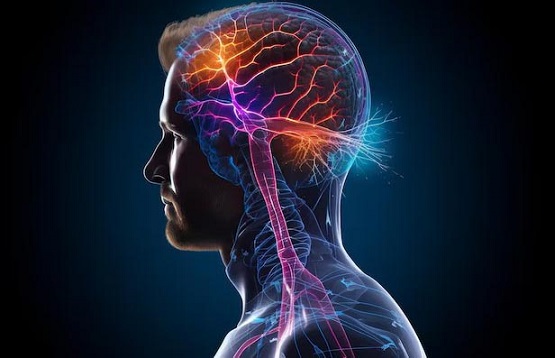German and Swiss Study finds that SARS-CoV-2 leaves an "innate immune scar" on the brains of the infected!
Nikhil Prasad Fact checked by:Thailand Medical News Team Jul 28, 2024 1 year, 5 months, 3 weeks, 1 day, 13 hours, 48 minutes ago
Medical News: Uncovering the Mystery of Post-COVID Brain Effects
A groundbreaking study has shed new light on the lingering neurological effects observed in individuals who have recovered from COVID-19. This
Medical News report delves into the intricate details of how the immune system's response to the virus leaves a lasting impact on the brain, revealing what researchers are now calling an "innate immune scar."
 SARS-CoV-2 leaves an "innate immune scar" on the brains of the infected!
SARS-CoV-2 leaves an "innate immune scar" on the brains of the infected!
Image - Freepik
Study Background and Objectives
The study, conducted by a collaborative team from renowned institutions including the University of Freiburg-Germany, the University of Basel-Switzerland, and the University Medical Center Hamburg-Eppendorf-Germany, aimed to uncover the underlying biological changes in the brains of individuals who have recovered from COVID-19. The research specifically focused on understanding the immune system's role in these changes, leveraging advanced spatial immune phenotyping and machine learning techniques.
Methodology: A Comprehensive Approach
To achieve their objectives, the researchers collected brain samples from 15 individuals who had fully recovered from COVID-19 but later died due to unrelated causes. This diverse cohort allowed for a thorough comparison with brain samples from healthy controls and individuals who had succumbed to acute COVID-19. The samples were meticulously analyzed using imaging mass cytometry, enabling the team to map the spatial distribution of immune cells in the brain at a single-cell level.
Key Findings: The Immune Landscape of Post-COVID Brains
One of the most striking findings of the study was the identification of specific immune cell clusters in the brains of post-COVID individuals. These clusters, primarily composed of microglia (the brain's resident immune cells), exhibited markers indicative of an activated state. Notably, these microglia formed characteristic nodules, a hallmark of chronic neuroinflammation often associated with viral encephalopathies and neurodegenerative conditions.
The research team observed a significant shift in the immune response in post-COVID brains compared to acute cases. While acute COVID-19 brains showed a higher presence of T-cells, suggesting an adaptive immune response, post-COVID brains were dominated by an innate immune activation. This innate response was characterized by a high frequency of TMEM119+P2RY12+CD68+Iba1+HLA-DR+CD11c+SCAMP2+ microglia, forming the aforementioned nodules.
The Role of Microglia in Post-COVID Neurological Changes
Microglia play a crucial role in maintaining brain homeostasis, but their persistent activation can lead to detrimental effects. The study highlighted that these activated microglia nodules were prevalent in the medulla and frontal cortex of post-COVID brains, areas critical for various neurological functions. The presence
of these nodules suggests a prolonged inflammatory state, potentially contributing to the neurological symptoms reported by many long-COVID patients.
Exploring Further: Immune Activation and Neuronal Health
To understand the implications of this immune activation, the researchers examined markers of neuronal damage. Interestingly, while acute COVID-19 brains showed significant axonal damage (as indicated by amyloid precursor protein deposits), the post-COVID brains did not exhibit such pronounced damage. This suggests that the persistent immune activation observed in post-COVID brains may not directly lead to immediate neuronal loss but could still contribute to subtle and long-term neurological alterations.
Implications for Long-COVID Patients
The findings of this study have significant implications for individuals suffering from long-COVID, a condition characterized by persistent symptoms long after the initial infection has cleared. By identifying the presence of chronic immune activation in the brain, the research provides a potential explanation for the neurological symptoms experienced by these patients. It also underscores the importance of continued research to develop targeted treatments that can mitigate this immune response and alleviate the long-term effects of COVID-19 on the brain.
Conclusion: A Call for Further Research
In conclusion, this study offers a crucial glimpse into the lasting impact of COVID-19 on the brain's immune landscape. By highlighting the shift from adaptive to innate immune activation in post-COVID brains, it opens new avenues for understanding and addressing the neurological sequelae associated with the virus. The research team emphasizes the need for further studies, particularly involving living patients with confirmed Neuro-Long-COVID, to build on these findings and develop effective therapeutic strategies.
The study findings were published in the peer-reviewed journal: Acta Neuropathologica.
https://link.springer.com/article/10.1007/s00401-024-02770-6
For the latest COVID-19 News, keep on logging to Thailand
Medical News.
Read Also:
https://www.thailandmedical.news/news/hong-kong-doctors-warn-that-covid-19-vaccines-can-cause-severe-inflammation-of-the-brain-s-blood-vessels
https://www.thailandmedical.news/news/unusually-late-onset-of-rare-brain-disease-after-covid-19
https://x.com/ThailandMedicaX?ref_src=twsrc%5Egoogle%7Ctwcamp%5Eserp%7Ctwgr%5Eauthor
